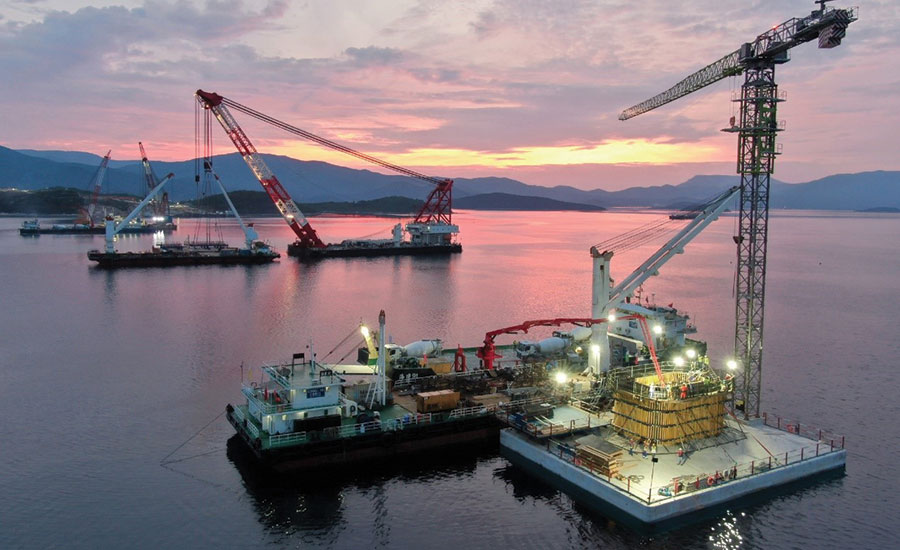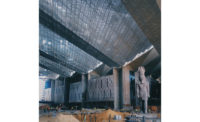The global construction market has had a rocky few years, with political upheavals, tariffs, trade wars and fluctuations in oil and metals prices hitting international contractors like a series of body blows. But now, the COVID-19 pandemic—and related plunge in oil prices from global shutdowns and price wars within OPEC—has put heavy pressure on large international contractors and their clients as they try to cope with markets under siege.
The uncertainties in the international market can be seen in the results of the ENR Top 250 International Contractors survey. This list ranks firms based on contracting revenue from projects outside of their home countries, measuring their presence in international commerce. The accompanying Top 250 Global Contractors list ranks contractors based on total worldwide contracting revenue, regardless of project locations.
The Top 250 International Contractors reported $473.07 billion in contracting revenue in 2019 from projects outside their home countries, down 2.9%, from $487.29 billion, in 2018. As a group, firms also reported $1.287 trillion in revenue from domestic projects in 2019, up 12.1%, from $1.148 trillion in 2018.
But the shaky state of the market in the past is nothing compared to what has happened since COVID-19 hit. The disease has affected the economies of countries across the globe and forced delays or shutdowns of projects worldwide.
While past bumps in the global market have generally been localized by country, region or market sector, the COVID-19 crisis has been universal in its impact. “One of the main dangers of the pandemic, as compared to other risks usually faced in business, is that it directly hit every element of the supply chain and has spread across all sectors and markets,” says Joseph Gebara, CEO of Contracting and Trading Co. of Lebanon. He notes that clients, suppliers, manufacturers, subcontractors, banks and the like all have been impeded in various ways, forcing contractors to come up with mitigation plans for all aspects of business impacted by the pandemic.
Disruption of the global supply chain also has led to the rise in lead time and cost of raw materials. “This puts intense time and cost pressure on existing projects,” says S. Paramasivan, managing director of Afcons Infrastructure Ltd., India. He says many construction sites are facing an acute shortage of labor, and firms now are forced to adhere to new on-site protocols that are reducing productivity.
Nationalistic reactions to the crisis also are taking a toll, even where projects continue. “Closed borders and not being able to transport materials have been common issues for almost every business for construction, literally bringing some projects to halt,” says Emre Baki, CFO of Renaissance Construction, Turkey.
Many countries are now taking steps to address the economic damage caused by COVID-19, looking at infrastructure packages to help people get back to work. “Unprecedented public relief packages and development funding in the infrastructure industry to revive the economy could support a rapid recovery in the near future,” says Paramasivan. But he worries that funds for such projects may be limited. “As substantial funds in all markets are put into addressing the pandemic, we expect a slowdown of project awards, in spite of the fact that infrastructure is one of the largest creators of employment.”
Some contractors fear the pandemic may lead to an international recession, further dampening the construction market. Some firms say this is likely if the U.S. economy continues to sag. If the spread of the virus in the U.S. continues at the current pace, it “will be a threat to the world economy and in the long term,” says Burhan Kurt, president of Turkey’s Ant Yapi U.S Holding Corp.
|
Related Links |
Impact Already Being Felt
Many contractors already have felt the impact of the pandemic on their business. Sales and profits of leading European contractors have been hit to varying degrees. Some expect recovery in the short to medium term while they review risk-sharing provisions in future contracts.
Before the virus emerged, Vinci Construction, one of Europe’s biggest contractors, “started the year very positively … we had a good backlog in all our divisions,” says Jérôme Stubler, chairman. Multibillion-dollar contract wins on the U.K.’s London-Birmingham high speed railroad and on France’s Grand Paris Express metro tunnels bolstered its order book for this year.
However, the virus started affecting Vinci’s sites in Asia in early March and then in Europe, reaching Africa and the Americas in April followed by jobsites in the Middle East. Depressed oil prices also delayed some of Vinci’s projects, including two 160,000-cu-m cryogenic liquid natural gas storage tanks in Russia’s arctic Yamal peninsula, where foundation work had already started, says Stubler.
“One of the main dangers of the pandemic, as compared to other risks usually faced in business, is that it directly hit every element of the supply chain and has spread across all sectors and markets.”
– Joseph Gebara, CEO, Contracting and Trading Co. “C.A.T.”
At the same time, numerous small municipal jobs have been shelved. Stubler advises authorities now to focus investment on smaller projects “because they are quick to release and they serve the local community.”
Vinci’s sales fell around 17%, to $6.8 billion in the first half of 2020. Revenue in France, accounting for nearly half the total, dropped by over 27%. Business outside France was more resilient, with sales dipping by around 5%. The pandemic contributed to a half-year loss of $378 million, down from a $75-million profit last year.
Sweden’s Skanska AB also started feeling pandemic impacts this year on contracts mainly in the U.K., U.S. and Central and Eastern Europe, says Anders Danielsson, president and CEO. “Nordic countries are pretty much unchanged,” he adds. Nordic profit margins in the first half of 2020 remained similar to last year at 2.9%, while falling to 0.2% from 1% in the rest of Europe. Profits rose by 0.5% to 1.7% in the U.S., “where the impact has been mainly in the building business,” says Danielsson. Generally, “underlying performance of the portfolio is improving,” he adds.
For Austria-based Strabag SE, 2019 was “another record year,” says Thomas Birtel, CEO. “All our resources were basically fully used and our order intake was stable.” His team had forecast a 2% sales dip for 2020, but revised that to a 10% tumble after including the pandemic’s impacts.
Lockdowns in various countries plus new anti-virus measures contributed to a nearly 90% drop in net profit, to $26 million during the first half of 2020 for Spain’s Acciona SA. Sales at the firm dropped by $622 million during that period to $3.5 billion, mostly due to the pandemic. Among corporate protection measures, Acciona halved the shareholder dividend paid last month and is reviewing asset sales.
Lockdowns in Spain and elsewhere also cut revenue for Madrid-based toll-road operator Abertis Infraestructuras SA, which hit the bottom line of its controlling shareholder, Germany’s Hochtief AG. After contributing $61 million to Hochtief’s first-half profit last year, Abertis had a $21 million loss this time.
Not counting Abertis, Hochtief’s operating net profit of $289 million in the first half of 2020 matched the same period last year. And while sales in the second quarter fell 8% below last year, the first half output remained virtually unchanged at $14 billion. The group’s resilience stems from “its diversification by geography and activities,” says chairman Marcelino Fernández Verdes.
Shutdowns were generally short-lived for Italy’s largest contractor Webuild SpA (formerly Salini Impregilo), says CEO Pietro Salini. The supply chain “was able to keep projects working, where possible.” Nevertheless, sales in this year’s first half were 18.3% below 2019, while margins on earnings before interest, taxes and amortization fell from 8.8% to 5%. “Revenue and margins are not lost, just postponed,” says Massimo Ferrari, the firm’s general manager of corporate finance.
Webuild’s acquisition of Italian contractor Astaldi SpA, plus government stimulus measures, will neutralize pandemic effects, Ferrari adds. With Astaldi, “our aim is to consolidate the highly fragmented construction sector in Italy to create a bigger player with a solid foundation in its home market, where we foresee very interesting business opportunities,” says Salini.
The U.K.’s largest contractor, Balfour Beatty, reported on August 12 a six-month pretax loss of $34 million, down from an $82-million profit during the same period last year, largely due to pandemic. The firm’s CEO, Leo Quinn, said the pandemic’s financial impacts were unavoidable but temporary. “We have preserved the disciplines, expert capability and financial strength we will need as markets move back to normal and then beyond, driven by fiscal stimulus for infrastructure.” He praised the company’s workforce for “working tirelessly, whatever the challenge.”
But some firms have worked through the crisis relatively successfully. For example, China Communications Construction Co. Ltd. launched an emergency response process quickly, while carrying out epidemic prevention and control programs to promote the resumption of work and production. As a result, “the value of contracts signed by the company in the first half of the year gained a year-on-year increase of 3.8%,” according to a CCCC spokesperson.
Worries About Europe
The European construction market is trying to come to terms with the impact of the virus. The U.K. had an already uncertain future because of its pending departure from the European Union. “Brexit’s impact on the future of the United Kingdom is expected to be profound and unpredictable,” says Kurt of Ant Yapi.
However, the COVID-19 crisis has made the U.K. market even more shaky. Only 15% of contractors responding to a recent survey by the U.K.’s Civil Engineering Contractors Association predicted workload to rise in the next 12 months. CECA Director of External Affairs Marie-Claude Hemming expressed surprise at this gloomy prognosis since “we would expect as the U.K. government rolls out its investments in infrastructure, it will work with industry to accelerate schemes and this outlook will improve.” Over 40% of the survey respondents reported falling workloads in the second quarter.
“As substantial funds in all markets are put into addressing the pandemic, we expect a slowdown of the project awards, in spite of the fact that infrastructure is one of the largest creators of employment.”
– S. Paramasivan, Managing Director, Afcons Infrastructure Ltd.
But “despite the government putting the industry at the front and center of its recovery plans,” the Construction Products Association (CPA) in the U.K. anticipates continuing uncertainty for the sector in its new forecast. It expects this year’s construction output to fall by 20.6%, with the biggest drops in private housing (-33%) and commercial buildings (-29%).
While CPA’s economics director, Noble Francis, expects an 18% rise in construction output next year, “this is compared with a low base of activity in 2020 and will still be 6.4% lower than pre-coronavirus levels,” he adds.
In France, civil and building prospects are stable, but Vinci’s Stubler expects a dip in private residential orders. Residential construction has dropped substantially in the U.K. along with the falling pipeline for civil construction. While demand in the rest of Vinci’s west European markets is slowing, prospects in Poland and the Czech Republic are “still good,” he says.
For Strabag, official lockdowns were “not challenging in most countries” except in Austria, says Birtel. Tough government regulations there led the contractor to shut all its roughly 1,000 sites in the country for about one month starting in mid-March.
But sites in Germany, which account for about half of Strabag’s sales, stayed open. Birtel expects a “high level” of demand in Germany, though private investment will likely shift from malls and hotels, for example, to other sectors. Poland is “coping very well,” says Birtel. Economies in Strabag’s Central and East European markets are “better than in Western and Northern Europe,” he says.
European contractors report diverse views on their geographical conditions. For Webuild, the U.S. already is its single largest market, and has been resilient during the pandemic, with sales growing in the first half. Italian sales were little affected by a short shutdown period. Business is picking up in the rest of Europe after shutdowns in France and Switzerland.
Middle East Moves
The Middle East market has been severely hindered by the virus and the resulting plunge in oil prices. “While on one hand the instability in crude oil prices has adversely affected investments in the infrastructure space, on the other, COVID-19 has severely disrupted progress across projects,” says S.N. Subrahmanyan, CEO of India’s Larsen & Toubro Ltd. The firm will exercise caution in picking future projects. He says most Gulf Cooperation Council (GCC) countries are on a “wait-and-watch” mode, “raising doubts about their ability to finance large infrastructure projects, maintain cash flows [and] stretching timelines to both approve and execute current and fresh projects.”
Further, GCC countries are taking strong steps to shore up their economies in the face of falling oil prices. Jalal Chaarawi, business development manager of Kuwait’s Combined Group Contracting Co., notes that Kuwait has restricted the issuing of work visas in reaction to COVID-19. And recently, Kuwait has also proposed to drastically limit foreign worker stays in the country to help shore up its internal workforce.
“In a surprise move, Saudi Arabia increased its VAT rate from 5% to 15% on July 1.”
– S.N. Subrahmanyan, CEO, Larsen & Toubro Ltd.
Another development in the Middle East was in Saudi Arabia. “In a surprise move, Saudi Arabia increased its [value-added tax] rate from 5% to 15% on July 1, 2020, to boost revenue and revive its oil-dependent economy,” says Subrahmanyan. The move comes just two years after Saudi Arabia first introduced its VAT system.
Subrahmanyan says another Saudi program may affect international contractors. Its localization program, the In-Kingdom Total Value Add (IKTVA )policy favors local sources of materials and labor to help accelerate the diversification of its economy away from oil and gas and to develop skilled jobs for Saudi citizens. He says there is the possibility of a ripple effect across the GCC member states that could introduce VAT systems, particularly the United Arab Emirates and Bahrain. Kuwait and Oman are likely to be the next GCC members to introduce VAT systems.
Despite pandemic disruptions, work still goes on. “All the contracts are intact and all our customers are paying on a regular basis,” says Birtel. To cover pandemic risk, “we will have to take care even more than before,” he says. But “already … in most countries we have stipulations in our contracts today,” Birtel adds.
Webuild’s Salini believes that provisions in contracts covering effects of law changes would cover social distancing and other mandatory anti-virus measures. “We are in talks with our clients about the coverage of the additional costs,” he says.
To account for pandemic risk, Stubler says clients are adopting two broad contractual approaches. Some want the risk priced into bids. Others ask firms to bid normally, agreeing to pay compensation. He prefers the latter transparent approach.
During the pandemic months, work from home by Strabag’s staff “worked out very well,” says Birtel. He does not expect the practice to remain widespread in the company, although “many, many meetings won’t take place physically,” he says. “COVID will definitely give digitalization a push in construction [and also] our overall behavior,” says Birtel. Vinci now has 95% of its roughly 3,000 staff back in their offices, says Stubler.
No one knows when the pandemic will wane. Some contractors, such as Kurt of Ant Yapi, predict that a COVID-19 vaccine will arrive in the first half of 2021, “which will boost the world economy and eventually bring real estate investments back from the shelf.” But regardless of when the crisis ends, international contractors will struggle to hold tight until it passes.






